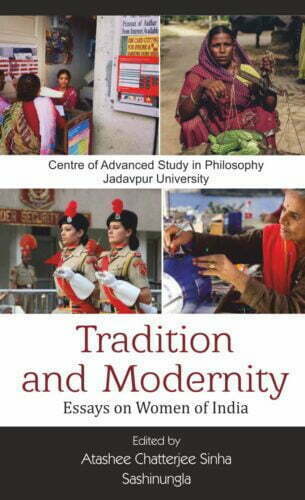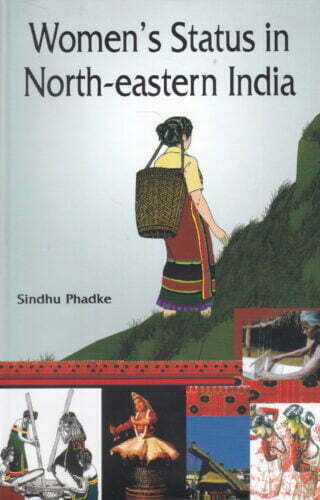Showing 73–77 of 77 results

This anthology explores the lived experiences and positioning of women in diverse Indian social, religious and cultural contexts. It deals with issues varying from the intricacies of the gender concepts embedded in contemporary traditionmodernity debates to detailed consideration of women currents of thought, action and life and the problem of understanding that they throw up.
The anthology Tradition and Modernity: Essays on Women of India includes essays ranging from the philosophical and analytical to the descriptive and the explorative and the experimental perspectives. It explores the lived experiences and positioning of women in diverse Indian social, religious and cultural contexts. The essays deal with issues varying from the intricacies of the gender concepts embedded in contemporary traditionmodernity debates to detailed consideration of women currents of thought, action and life and the problem of understanding that they throw up.
While a majority of the papers rightly reflect on the unequal and oppressive situation of the women in highly patriarchal and hierarchical settings, yet there are quite a few which sensitively touch upon the theme of human spirit and the beauty of love and relationships between man and woman in the midst of caste and gender hierarchies. There is reflection on the theme of the growing awareness about the women, environment and development, particularly the relationship between violence of nature and women.
This collection of writings will appeal to readers of all hues as well as students and scholars of culture and religion, in particular of India, gender equality, democracy and difference and feminist theory.
Lord Buddha, in his profound wisdom, said that for extinction of human suffering, complete annihilation of desire is the only way. This is the sacred truth of suffering.
Acarya Carvaka, equally profound in his thinking, said that life is a continuous celebration of desire. Kama (desire) and artha (wealth) are the only true goals of life. Beg, steal or borrow, but live life like a king. Enjoy life full as long as one is alive.
Who is correct? Lord Buddha or Acarya Carvaka? What is desire really meant to Indian society, religion and culture through ages?
The book tries to address these and similar questions objectively and diligently.

Inspired by her extensive travels as UNICEF’s Representative, the author has provided valuable information Þ some hitherto unknown to us Þ supported by statistics, maps and charts on the various aspects of life in the seven North-Eastern States of India in general and the plight of women in particular.
The vast socio-economic and cultural diversity of the north-east region of India remains a largely unexplored area of academic research. Within it, the status of women continues to be a neglected aspect. This book contributes to the slowly expanding body of literature on the subject of the status of women in the seven North-Eastern States of India, viz. Assam, Arunachal Pradesh, Manipur, Meghalaya, Mizoram, Nagaland and Tripura. The author makes a painstaking effort to put together the economic, social, educational and cultural dimensions of the plight of women in these States, in the uniquely individual ecological, historical, social and political backdrop of the region. In the process she uncovers many aspects hitherto unknown to us, and also demolishes certain standard and pre-conceived notions about North-Eastern women. We learn about the distinctive features of each State, individually, in relation to each other, and the country as a whole. Using primary and secondary sources, the author builds up a useful wealth of statistical information about the subject; the book also contains explanatory maps and charts. In all, it is a useful text not just for scholars of the North-East and Gender Studies, but also for the general readers as well.
इस पुस्तक में राष्ट्रवाद की पश्चिमी एवं भारतीय अवधारणा के अनुसार व्याख्या की गई है तथा दोनों में अन्तर्विरोधों एवं विशिष्टताओं को रेखांकित किया गया है। पश्चिम में परिप्रेक्ष्य रहित व्यक्ति की अवधारणा पर आधारित राष्ट्रवाद राजनीतिक राष्ट्रवाद के रूप में ही क्यों परिणत होता है और वह मानवतावाद के विरुद्ध क्यों प्रवृत्त है, यह इस पुस्तक का प्रथम प्रतिपाद्य विषय है। अद्वैत दर्शन पर आधारित सर्वात्मवादी राष्ट्रवाद मानवतावाद की ओर कैसे अग्रसर होता है यह पुस्तक का दूसरा प्रतिपाद्य विषय है। राष्ट्रवाद के प्रायः सभी प्रभावी विमर्शों की चर्चा के साथ-साथ यह पुस्तक भारतीय राष्ट्रवाद का एक अवधारणात्मक विमर्श प्रस्तुत करती हैए जिसे सर्वात्मवादी राष्ट्रवाद का नाम दिया गया है। इस पुस्तक में आधुनिकता को भारत विभाजन के मुख्य कारण के रूप में स्थापित किया गया है।
इस पुस्तक में राष्ट्रवाद की पश्चिमी एवं भारतीय अवधारणा के अनुसार व्याख्या की गई है तथा दोनों में अन्तर्विरोधों एवं विशिष्टताओं को रेखांकित किया गया है। पश्चिम में परिप्रेक्ष्य रहित व्यक्ति की अवधारणा पर आधारित राष्ट्रवाद राजनीतिक राष्ट्रवाद के रूप में ही क्यों परिणत होता है और वह मानवतावाद के विरुद्ध क्यों प्रवृत्त है, यह इस पुस्तक का प्रथम प्रतिपाद्य विषय है। अद्वैत दर्शन पर आधारित सर्वात्मवादी राष्ट्रवाद मानवतावाद की ओर कैसे अग्रसर होता है यह पुस्तक का दूसरा प्रतिपाद्य विषय है। राष्ट्रवाद के प्रायः सभी प्रभावी विमर्शों की चर्चा के साथ-साथ यह पुस्तक भारतीय राष्ट्रवाद का एक अवधारणात्मक विमर्श प्रस्तुत करती हैए जिसे सर्वात्मवादी राष्ट्रवाद का नाम दिया गया है। इस पुस्तक में आधुनिकता को भारत विभाजन के मुख्य कारण के रूप में स्थापित किया गया है।